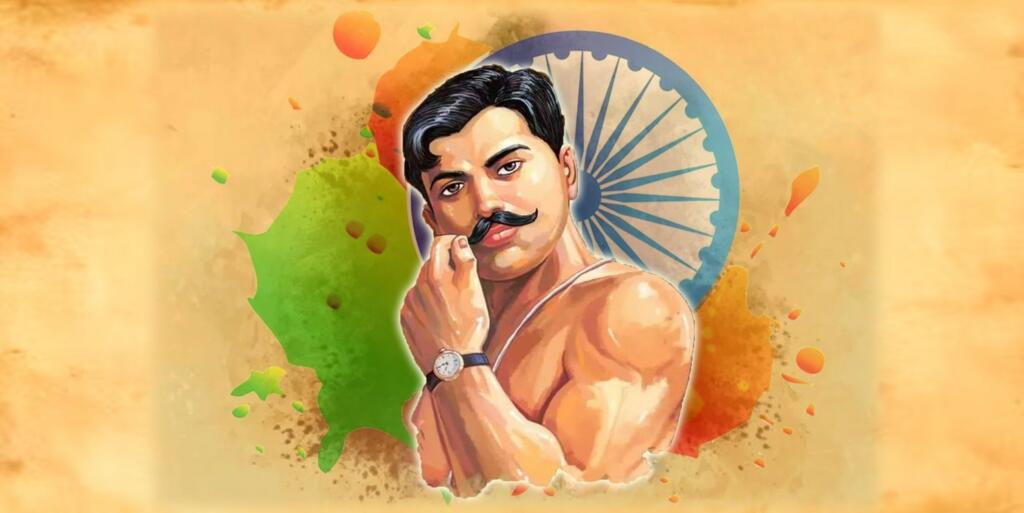Chandra Shekhar Azad Death Anniversary: Chandrashekhar Azad was an iconic freedom fighter whose name is synonymous with the Indian independence movement along with Sardar Patel, Netaji Subhash Chandra Bose, Bhagat Singh etc. He is best known for his involvement in the Kakori train robbery and the Hindustan Socialist Republican Association (HSRA), a revolutionary organisation that aimed to overthrow British rule in India.
Today is Chandra Shekhar Azad Death Anniversary and on February 27, 1931, at the tender age of 24, he made the ultimate sacrifice for his country and India lost one of its most devoted and courageous sons. His unwavering commitment to the cause of India’s freedom will always be remembered. He was one of the most prominent freedom fighters of India’s struggle for independence. He was a highly skilled and elusive revolutionary who was difficult to track down. Despite this, he was eventually surrounded by the British police and eventually he laid down his life for the motherland.
But the question of who gave information to the British police about Azad’s whereabouts has long been a matter of speculation and debate. Although there were many haters of Chandrashekhar Azad but in all of them, 3 names come prominently, who betrayed Pandit ji somewhere and they would have benefited from it in one way or the other.
Veerbhadra Tiwari
Virbhadra Tiwari was the first to be charged in the case, as he had held a grudge against the Hindustan Socialist Republican Army (HSRA) and Chandrashekhar Azad. The latter’s demise has been frequently documented in many biographies, with Tiwari being often mentioned in the same. He had been enlisted as one of the junior members of the HSRA and was tasked with carrying out minor errands.
Now doubt is natural, can anyone who lacks influence in the party be trusted to know the full extent of Chandrashekhar Azad’s activities? Apart from this, it is known from all the sources available that Virbhadra Tiwari had no idea of Chandrashekhar Azad’s maximum information. Therefore, who could have been responsible for the betrayal of Chandrashekhar Azad, given that only someone with detailed and up-to-date information could have done so?
Jawahar Lal Nehru
At the time of Chandrashekhar Azad’s death, Jawaharlal Nehru was still a prominent figure in the discussion. His father, Motilal Nehru, was a well-known advocate, Congress leader, and had given financial support to the revolutionaries. However, Jawaharlal Nehru was not as supportive of the revolutionaries, and even viewed them with a sense of inferiority.
Recently, a number of opportunities have arisen that have been met with varied reactions. For example, Nehru described Azad’s meeting with him at Anand Bhavan as indicative of a ‘fascist attitude’. This idea has been heavily criticised by the revolutionary Manmath Nath Gupta in his writings, and some people also claim that Nehru gave 1,000 rupees to some members of Azad’s party to send them to Russia for training in socialism, out of which 448 rupees were found in Azad’s clothes after his death.
Apart from this, a few days before his sacrifice, Chandrashekhar Azad came to appeal to Nehru one last time to convince Gandhi and pressurise the British government to forgive the death sentence of Bhagat Singh, Sukhdev and Rajguru. But Nehru started giving evasive answers, due to which Chandrashekhar Azad came out fuming in anger.
So, was Chandrashekhar Azad betrayed by Nehru? Perhaps or not. The revolutionaries clearly upset Nehru, and he had the power to destroy their entire party if he so desired. A revolutionary like Chandrashekhar Azad would be of little importance to him in such a circumstance. Although Nehru lacked patience and was immature, but not devious.
Also read: The untold story of HSRA’s affinity to VEER Savarkar
Yashpal
Is Yashpal held accountable for Chandrashekhar Azad’s death? But how is this possible? According to the tweet of eminent historian and famous economic advisor Sanjeev Sanyal- “It is said that Yashpal was the main reason for the martyrdom of Chandrashekhar Azad. That’s why some revolutionaries were after him. To save him, he was kept in jail and the British took great care of him”.
Not only this, he completed his sentence in only 6 years as compared to common revolutionaries and also got married in jail (which was unusual). In 1946 a letter was received about how Yashpal was transferred as a ‘Khabri’. He then made inroads into the Communists as well and a member of the Muslim League from Saharanpur and a member of the Congress from Allahabad were also involved in supporting him.”
A major structural problem with Indian intellectual life is that it was taken over mostly by those who had collaborated rather than opposed colonial occupation. See attached letter from 1946 on how Hindi writer Yashpal was "handed over" as an informer 1/n pic.twitter.com/f9y6ILYhYq
— Sanjeev Sanyal (@sanjeevsanyal) April 17, 2019
Here Sanjeev is currently accurate because many revolutionaries had to live in secrecy following independence, whilst Yashpal enjoyed lavish living as if he were the government’s personal son-in-law. In addition, this person claimed that Veer Savarkar had given Chandrashekhar Azad and his allies the order to kill Mohammad Ali Jinnah, when in reality Azad had been taken aback by Savarkar’s financial support and favour, but because of his slightly different ideology, they did not fully support Savarkar.
In such a situation, who betrayed Chandrashekhar Azad, it is a mystery even today, but it is clear that our own people gave more wounds to our brave warriors than the British did. Today is Chandra Shekhar Azad Death Anniversary and let’s remember this great patriot soul.
Support TFI:
Support us to strengthen the ‘Right’ ideology of cultural nationalism by purchasing the best quality garments from TFI-STORE.COM
